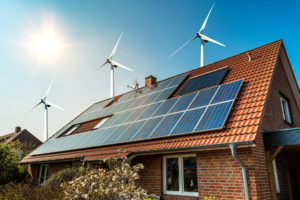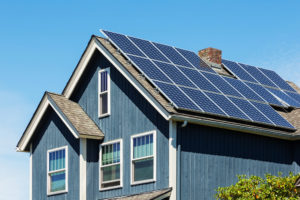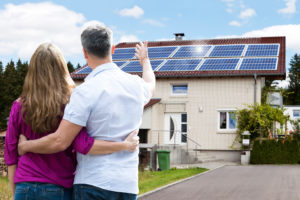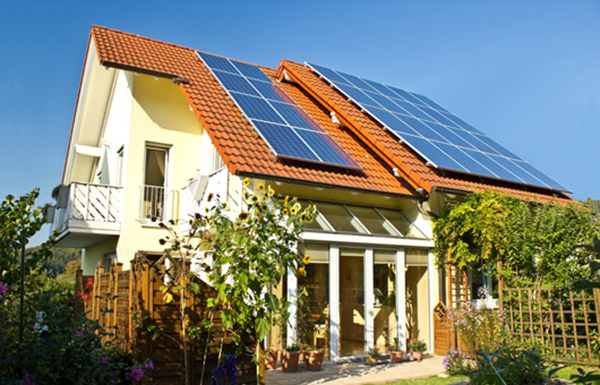Solar panels have become more aesthetically pleasing, easier to install and more affordable since they first become available. They have also become more popular among homeowners because they are environmentally friendly. Many people who invested in solar panels will also tell you that they are money savers. Still, the installation of solar panels on your home is a hefty cost. So, do solar panels really save you money? We’re here to tell you that the answer is a definite yes. However, the amount of money you actually save varies from household to household. This is because there are many factors that come into consideration.
Below are tips on buying solar panels, and answers to frequently asked questions about going solar.
How Much Sun Do Solar Panels Need?
If you live in a very wooded area and there are trees over your home that block the sun, solar panels may not be used to their full potential. It is true that the exposure your home, specifically your roof, has to direct sunlight determines how much your solar panels will be utilized. Ideally, you’ll want your roof to be angled south to get the most amount of sunlight. However, even if you don’t get an overbearing amount of sunlight year-round, solar panels will still save you money long-term. This is true even for home in Seattle. You don’t have to live in sunny California or Florida to benefit from solar power.
How Much Do Solar Panels Cost?
 In general, the price of solar panel systems have dropped, although they are still expensive to install initially. Typically, the cost depends on the extensiveness of the solar paneling that you choose. In 2017, the average homeowner paid between $2.87 and $3.85 per watt to install solar panels. Before tax credits, the average solar power system cost $16,800, and between $10,045 and $13,475 after tax credits. Tax credits vary from state to state, so check to see what you qualify for. Also, look for rebates when shopping for solar panels. There are also lots of government incentives to buy them so check your local and state policies. There are also some federal tax credits that can save you up to 30% of the full cost of the solar panels you have installed. For state incentives, visit here.
In general, the price of solar panel systems have dropped, although they are still expensive to install initially. Typically, the cost depends on the extensiveness of the solar paneling that you choose. In 2017, the average homeowner paid between $2.87 and $3.85 per watt to install solar panels. Before tax credits, the average solar power system cost $16,800, and between $10,045 and $13,475 after tax credits. Tax credits vary from state to state, so check to see what you qualify for. Also, look for rebates when shopping for solar panels. There are also lots of government incentives to buy them so check your local and state policies. There are also some federal tax credits that can save you up to 30% of the full cost of the solar panels you have installed. For state incentives, visit here.
Some people may choose to lease or finance their solar panels instead of paying in full upfront. The savings are greater in the long run if you buy upfront. However, if that’s not possible you will still save money on electricity.
Which Solar Panels Should I Purchase?
The solar panel market is inflated with companies spending lots of money on advertising to prospective customers, which then inflates the rates of solar panels. According to the U.S. Department of Energy, consumers should compare as many solar panel companies as possible to avoid paying inflated rates. You should also make sure that you’re buying a high-quality product so that it works optimally. Buying from a bigger name doesn’t necessarily mean you’re getting the best product. In fact, it mostly just means that you’re paying the highest prices. Whether it’s a big or small company, don’t buy a cheap product that will end up being inefficient. With this type of investment, you will require high-quality equipment to get the most savings. Also, make sure your hardware comes with a comprehensive warranty.
How Long Does Installation Take?
Installation of a full solar panel system can take anywhere between five weeks and six months. The longer it takes, the more you will pay in labor and the longer you’ll have to wait to save on electricity bills. Make sure to check the reviews of your solar service provider. Helpful websites include yelp.com, consumeraffairs.com and solarreviews.com. Time consuming factors involved in installation including getting permits and having local authorities do inspections of the panels.
Before doing anything, make sure you have the proper building permits. Contact your city’s zoning departments to find out if you are eligible for a permit.
How Much Money Will I Save?
The average American household spends over $1,400 a year on electricity. Also, electricity rates fluctuate and go up over time, something people don’t always realize. In fact, electricity rates rise at about 2% annually. Therefore, installing solar panels can be a great way to save money long-term. This is because solar panels are usually a one-time cost, compared to a monthly bill. You may, however, still pay electricity bills if the size of your solar system is large enough to take care of 100% of your electricity usage.
Still, solar panel savings tend to increase over time. In a 20-year period, savings can range from $7,000 to $90,000! The wide discrepancy is due to factors, including:
- Climate of the home

- Electricity rates in the area
- Size and quality of the solar panels
- Number of trees shading the home
- Angle and size of the roof
- Temperature and altitude of the area
For example, San Francisco is typically cool, cloudy and foggy. That means homes with solar panels in this city will generate less solar energy than homes in areas with plenty of direct sunlight. However, solar panels can still be efficient in cooler temperatures, just as long as they receive enough sunlight. A professional solar panel installer can use special tools to measure light patterns to determine how much solar energy you should expect per day, month and year. Hold the installation company to their word and request a guarantee on this estimate.
What Are Other Benefits Of Solar Panels?
- Environmentally-friendly. If you want to reduce your carbon footprint or reduce your greenhouse gas emissions, solar panels may be a good investment for you.
- Backup energy source. Solar panels can also be incredible sources of backup energy if there’s ever a blackout or electricity cut in your home.
- 25-year warranty. Most people choose not to insure their solar panels because a reputable system often comes with a 25-year warranty for malfunctions and damage. Even if you’re leasing, the manufacturer will cover most, if not all, repairs.
Will My Homeowners Insurance Rate Increase?
 Your Homeowners Insurance premium will not necessarily increase because some carriers see solar panels as additional security for your roof. Regardless, you must report installed solar panels to your insurance company. This is because the value of your home increases with solar panels. However, as mentioned above, you may not need additional insurance coverage for your solar panels if they come with a warranty.
Your Homeowners Insurance premium will not necessarily increase because some carriers see solar panels as additional security for your roof. Regardless, you must report installed solar panels to your insurance company. This is because the value of your home increases with solar panels. However, as mentioned above, you may not need additional insurance coverage for your solar panels if they come with a warranty.
Some people still opt to insure their solar panels, as it is an investment. If you plan to do so, check with your policy to see if it covers maintenance and installation costs related to repairs.
Other Helpful Tips
- State incentives and rebates. Some states offer various rebates or incentives. If you live in California, you are eligible for tax credits and rebates after installing solar panels. The rebates can range anywhere from $.20 to $1.25 per watt of solar capacity. Homeowners can get rebates as high as $10,000 on their solar panels. Most are also eligible for Investment Tax Credit, which offers a 30 percent discount on top of the rebates and state incentives.
- Technician experience. Make sure your solar power technician has experience working on the type of roof you have on your home. Don’t assume the best only to be delivered a disaster.
- Homeowners Insurance. Speak with a trusted Insurance Specialist at (855) 247-5298 if you have further questions about insuring solar panels or how a solar system will affect your Homeowners Insurance policy.
The information in this article was obtained from various sources. This content is offered for educational purposes only and does not represent contractual agreements, nor is it intended to replace manuals or instructions provided by the manufacturer or the advice of a qualified professional. The definitions, terms, and coverage in a given policy may be different than those suggested here and such policy will be governed by the language contained therein. No warranty or appropriateness for a specific purpose is expressed or implied.

